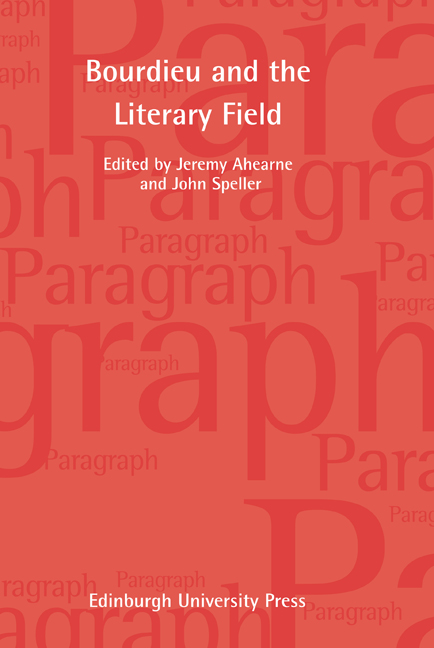Book contents
- Frontmatter
- Contents
- Introduction: Bourdieu and the Literary Field
- How Field Theory Can Contribute to Knowledge of World Literary Space
- Autonomy Revisited: The Question of Mediations and its Methodological Implications
- The Literary Field and the Field of Power: The Case of Modern China
- Between Repression and Anamnesis: Pierre Bourdieu and the Vicissitudes of Literary Form
- Reading and Reflexivity: Bourdieu’s Faulkner
- Fields and Fragments: Bourdieu, Pascal and the Teachings of Literature
- On an Enigmatic Text by Pierre Bourdieu
- Apollinaire, Autumn Ill
- Notes on Contributors
Between Repression and Anamnesis: Pierre Bourdieu and the Vicissitudes of Literary Form
Published online by Cambridge University Press: 17 September 2020
- Frontmatter
- Contents
- Introduction: Bourdieu and the Literary Field
- How Field Theory Can Contribute to Knowledge of World Literary Space
- Autonomy Revisited: The Question of Mediations and its Methodological Implications
- The Literary Field and the Field of Power: The Case of Modern China
- Between Repression and Anamnesis: Pierre Bourdieu and the Vicissitudes of Literary Form
- Reading and Reflexivity: Bourdieu’s Faulkner
- Fields and Fragments: Bourdieu, Pascal and the Teachings of Literature
- On an Enigmatic Text by Pierre Bourdieu
- Apollinaire, Autumn Ill
- Notes on Contributors
Summary
Abstract:
Pierre Bourdieu's work on literature has frequently been criticized for its perceived failure to attend to the specificities of literary form. This article argues that, in fact, literary form plays an important role in Bourdieu's theorizations of literature, or rather, that form is called upon to play a range of different, potentially conflicting roles. Through close readings of both The Rules of Art and the 1975 essay ‘L’Invention de la vie d’artiste’ (The Invention of the Life of the Artist), the article seeks to clarify the different roles Bourdieu attributes to literary form, as that which both conceals and reveals ‘repressed’, ‘incorporated’ or ‘unconscious’ social realities. It will examine Bourdieu's contention that the literary work functions analogously to the Freudian dreamwork in this respect, and will question how appropriate or convincing that analogy proves to be.
Keywords: Pierre Bourdieu, literary form, anamnesis, repression, socioanalysis, psychoanalysis, Flaubert, Sentimental Education
In an article of 1991, Toril Moi concluded that, whatever Pierre Bourdieu's work might have to offer feminist theory, its value to feminist literary studies was strictly limited, since, ‘insofar as his is not a theory of textuality at all, a purely Bourdieusian reading’ of literary texts would be ‘unthinkable’. Two years later, Jacques Leenhardt seemed to confirm Moi's contention that Bourdieu's sociology of literature was unable to account for the specificities of the literary form and of the kinds of truth to which it might offer access. He argued that Bourdieu's analyses of literary texts were marked by a questionable dichotomy between sociological reason and literary form, the former corresponding to the domain of objective, scientific truth, the latter relegated to the realm of the sensual, the magical, of embodied belief and repressed truth, against which sociology defined itself. Morag Shiach has also criticized what she sees as the failure by Bourdieu to take any account of literature's specific characteristics. In a critique of the reading Bourdieu offers of Virginia Woolf 's To the Lighthouse in his analyses of ‘masculine domination’, Shiach regrets his tendency ‘to treat the novel as a series of descriptions rather than as a text that might embody contradiction or offer a formal challenge to the categorial differences [between the sexes] with which it begins’.
- Type
- Chapter
- Information
- Bourdieu and the Literary FieldParagraph Volume 35, Number 1, pp. 66 - 82Publisher: Edinburgh University PressPrint publication year: 2020



